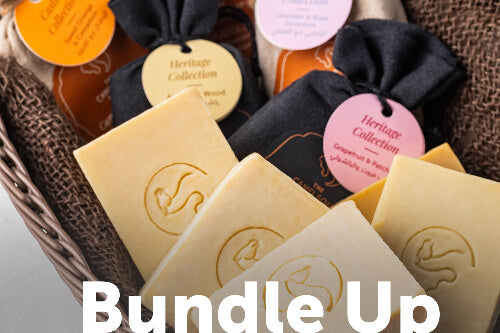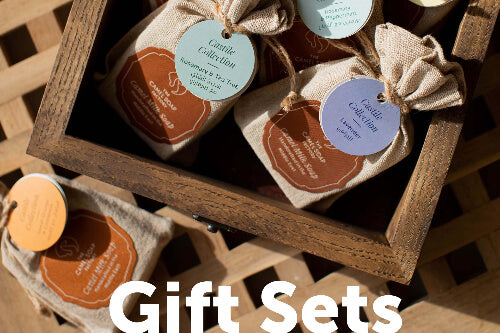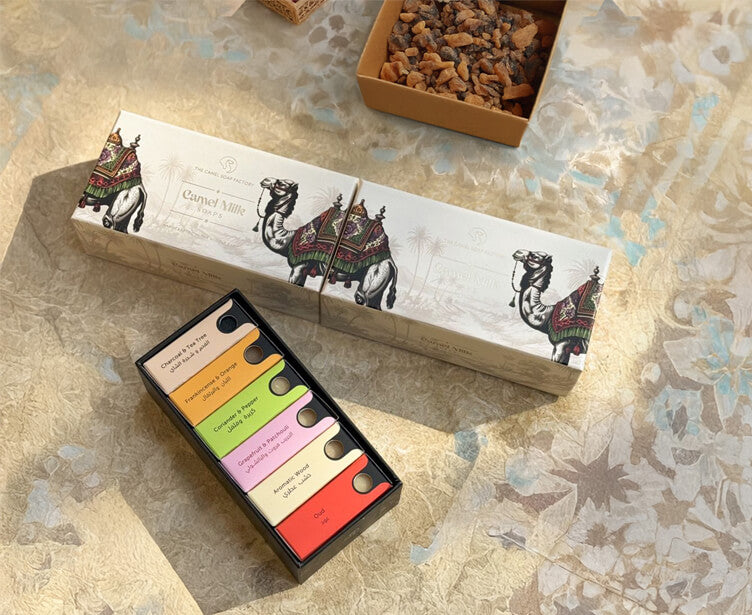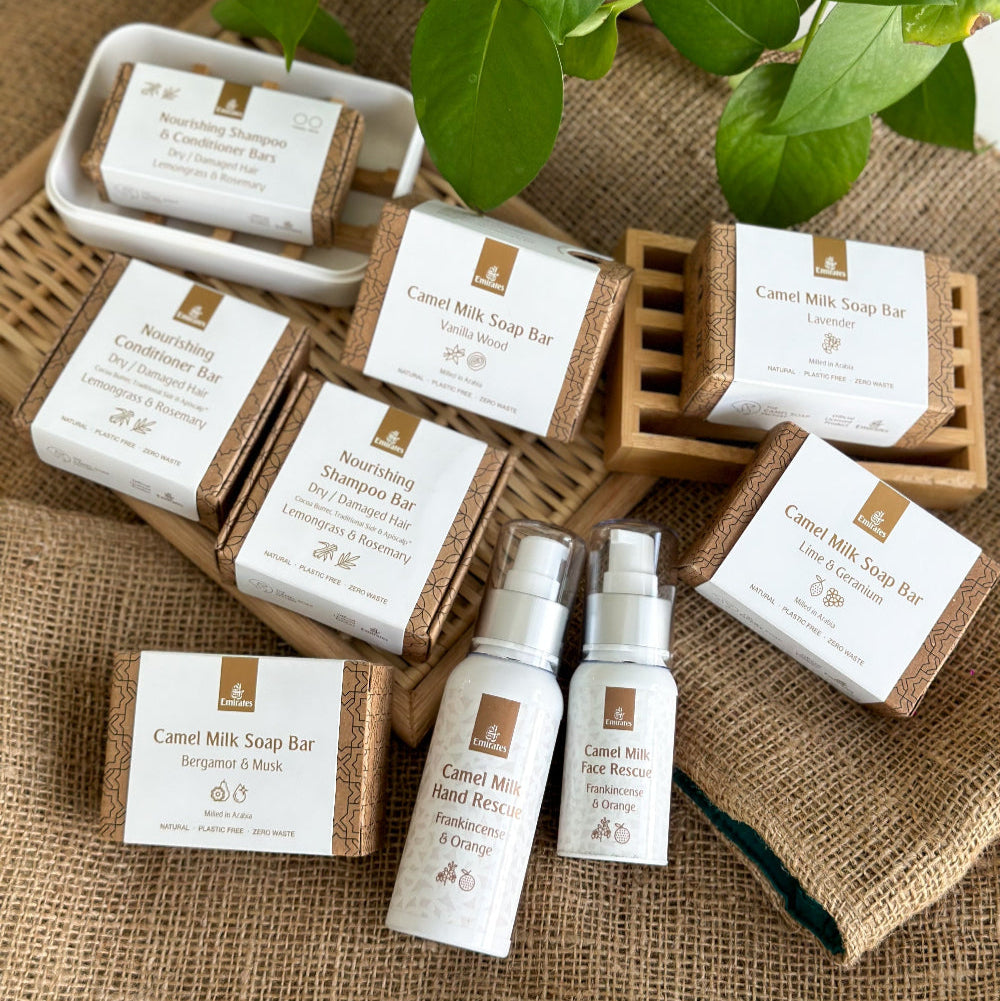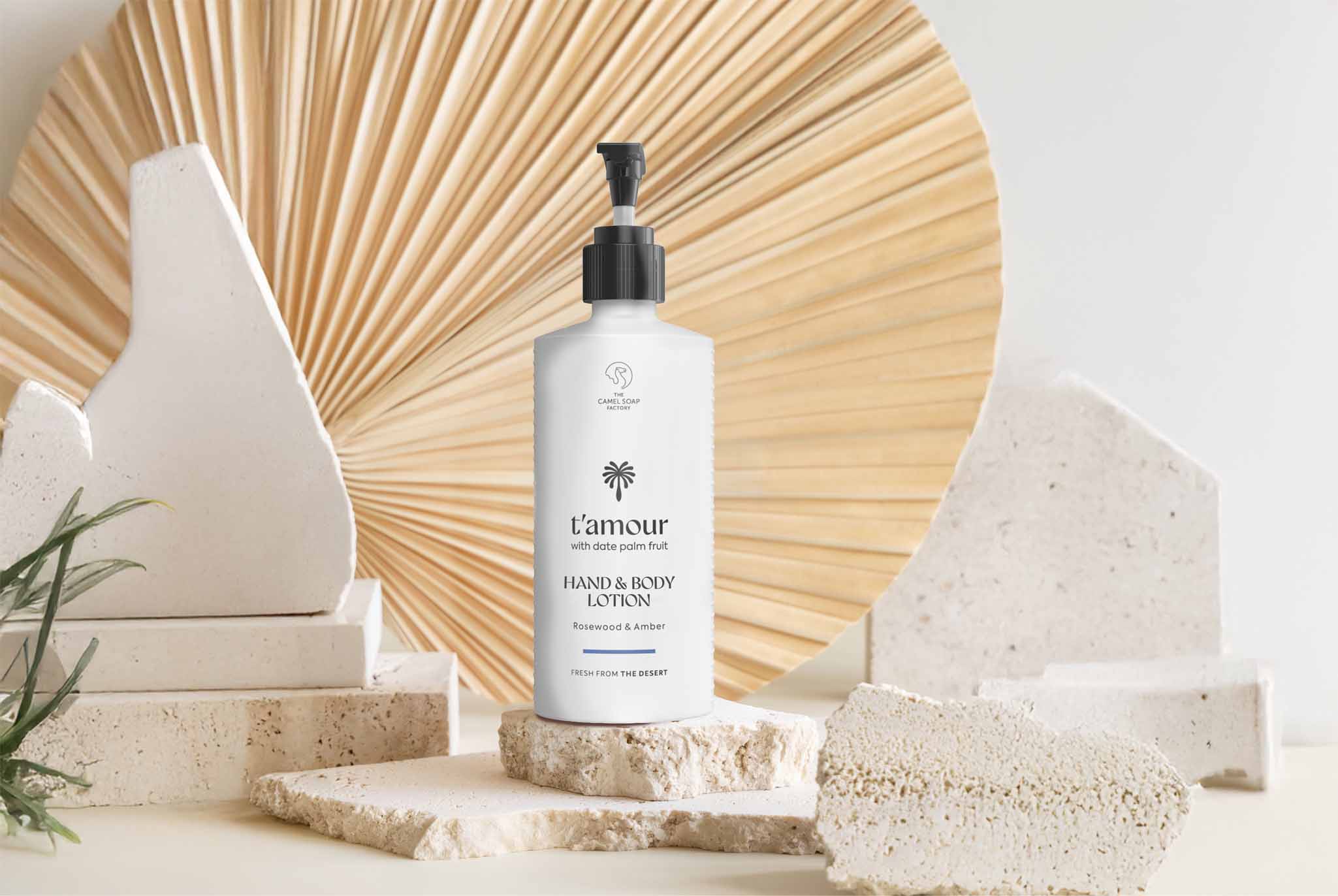FAQ
Camel Milk Skincare Benefits
Why is Camel Milk Good for Skincare?
Camel milk is a notable ingredient in skincare, renowned for its gentle yet effective revitalizing and nourishing properties. Rich in natural components such as lactic acid and Alpha Hydroxy Acids (AHAs), along with an abundance of vitamins A, C, and E, and an array of minerals, it plays a key role in enhancing skin health.
The application of camel milk involves a mild exfoliation, aiding in the cleansing process, and actively contributing to the repair of skin cells. Additionally, it promotes collagen production, thereby contributing to the maintenance of a resilient and healthy complexion.
Why is Camel Milk Beneficial for Skin in General?
Thanks to the composition of nutrients in camel milk, it offers many benefits to different skin types. One this is for certain, the following benefits are the baseline to it's nourishment. Making camel milk a great option for all skin types.
- Skin tone - Alpha Hydroxy Acids and lactic acids lighten and even the skin tone.
- Aging skin - Vitamin A, also known as retinol, is a powerful ingredient in skincare for plumper, younger-looking skin. Vitamin E is a natural antioxidant which helps slow signs of aging.
- Scar tissue & Age Spots: Alpha Hydroxy Acids help correct scars and age spots. Potassium reduces blemishes whilst Vitamin D and Zinc helps the skin grow and repair itself.
- Wrinkles - Alpha Hydroxy Acids and Calcium improve the appearance of fine lines and wrinkles. Selenium is great at promoting skin elasticity.
Camel Milk Benefits for Dry & Damaged Skin?
Amongst the general benefits, Vitamin E and Lactic Acids work together to provide a super-effective treatment for dry skins.
Camel Milk Benefits for Oily & Acne-prone Skin
Amongst the general benefits, Vitamin A helps regulate oily skin whilst Lauric and Myristic Acids provide a gentle cleansing, removing excess oils.
Alpha Hydroxy Acids and the combination of Vitamin C and Zinc have been shown to reduce acne breakouts.
Benefits for Skin Conditions?
Amongst the general benefits, Vitamin D and B2 can help reduce the symptoms for Eczema, Psoriasis and Rosacea.
Is Camel Milk Safe for Sensitive Skin?
In short, yes. Camel milk is a natural ingredient and safe for skin use. Although a reaction is highly unlikely, we always suggest using on a portion of the skin before committing to full usage.
About Our Products
What products do you manufacture?
We offer a range of natural skincare products. To-date we have focused on body and facial soaps, lip balms and have recently introduced a fabulous Anti-Ageing Moisturiser made with camel milk and pure Omani Frankincense essential oil. We will be following this ‘face cream’ with a moisturising hand and body cream.
We will continue to innovate, and are always exploring ways that we can incorporate exciting regional ingredients into our product range.
What do you mean by “Natural”?
We recognise that there really aren’t any ‘Natural’ skincare products since these simply don’t exist in nature. When we say our skincare products are natural, it’s our way of saying that we take natural ingredients and blend them together to create nature derived products. Our products contain no petrochemical derivatives, no synthetic dyes and no synthetic preservatives.
Are your skincare products vegan?
No, our products would not be classed as vegan due to the camel milk we add to all of our products. Other than our fresh, pasteurised camel milk, we use only plant oils and butters.
Do you harm Camels?
Let be quite frank about this: We love camels!
We use no part of the camel other than their and fresh, pasteurised whole milk. We source our camel milk from one of two camel milk dairies in the UAE and visit often. We’re happy to report that they are some of the most pampered camels around, and are very well treated.
Are your products meant to be used on camels and other pets?
Our products, made with camel milk, are designed for human use. However, our natural soaps are packed with beneficial nutrients, and some customers have used them on their horses and other pets. We won't stop you from spoiling your furry friends!
Do you test your skincare products on Animals?
No, we absolutely do not. All of our products are tested on very willing friends and family.
Are your products safe to use while pregnant?
Yes, our products are all natural and are safe to use during pregnancy. As a precaution, if you have a sensitive skin or allergies to any of the ingredients and test on a small portion of skin before committing to full usage.
About our Natural Soaps
What is handmade soap?
Handmade soap is a simple business really. Oils, in the form of liquids or butters, are mixed with an alkali, or base, and soap forms. Really, it’s that simple. The process of oils being magically converted to soap is called saponification.
It’s a process that was first documented around 2800 BCE in ancient Babylon. Since then the process has been refined and studied, to the point that we’re now able to custom make soaps for specific applications and with well-defined properties.
How do you make your soaps?
Our soaps are made the old-fashioned way: – with love and mindful attention to quality.
We use no machines, instead we handcraft in small batches using the centuries old cold process method. We use no heat in making our soaps which ensures that none of the goodness and healing properties of our pure ingredients is destroyed. As with many good things in life, the cold process method is really quite simple.
We mix our oils and camel milk together with a saponification agent which starts the process of turning these raw ingredients into our gorgeous camel milk soaps. The exact ratios of oils and camel milk is a bit of a secret – let’s just say that we do a lot of research and run many trials before we approve our products. As the raw ingredients start their journey to becoming a natural soap (a process known as saponification), we gently blend in the finest natural essential oils that give our soaps their fabulous fragrance and aromatherapy properties.
Once the ingredients are blended, and while still in liquid form, the mixture is poured into large square moulds in which the liquid will settle and solidify. Once solidified, the soap is turned out and the blocks are hand cut to size and our logo stamped. At this stage the bars are moved into a climate controlled drying room in which they are left for four weeks to air dry and harden.
Only once the bars are cured, and only if we’re completely satisfied with the quality of the batch, are they hand packed into our hallmark natural cotton bags.er
Why should I choose handmade soaps over commercial soaps?
In general, the commercial soaps carried by most chain stores are made using a slurry of chemicals that are mixed, dried and then stamped into the smooth neat bars you see.
The base chemicals that are most often used are petrochemicals, sulfates mixed with a variety of surfactants and foaming agents that can dry our skin and lead to rashes and other skin irritations. The vast majority of commercial soaps are actually synthetic detergents, not real soap: – great for squeaky clean dishes, not so great for skin. Natural handmade soaps, on the other hand, are made from really simple ingredients: – natural oils like Olive and Almond Oil. When combined with a saponification agent, in a process that’s been known for centuries, real soap is formed.
Like most good things in life, it’s a really simple, clean process that results in a skin loving, moisturising product. It’s often difficult, in-store, to tell the difference between a detergent and a soap. Commercial soaps and detergents will seldom be labeled and marketed as such. We have one word of advice: labels. Read the label.
Look out for ingredients like sodium lauryl sulfate or cocomidopropyl betaine which you really want to avoid. Natural soaps will have an ingredient list that either specifies the oils that were used in its manufacture (Olive Oil, Coconut Oil, Shea Butter etc.) or will specify the saponified version of these oils (sodium olivate, sodium coconate, sodium shea butterate etc.) and in this case will also list Aqua and Glycerin – if it doesn’t, it’s not real soap.
We use real ingredients, sourced from nature and selected for their protective, nourishing and hydrating properties. Scented with essential oils, we use no colourants and endeavor to use the most natural preservatives we can find (in our creams, scrubs and balms).
What’s in your soaps?
Our company name may hint at one of our unique ingredients – Camel Milk, which we use for its skin loving properties.
It seems that Cleopatra was on to something with her daily ritual of bathing in camel milk. The extraordinary properties of camel milk have been known for centuries, but only recently has research supported its relevance to skin care.
Rich in Alpha-Hydroxy Acids, vitamins, anti-ageing and anti-inflammatory immune proteins; camel milk helps to nourish the skin naturally and complement the skin’s own natural immunity.
In addition to the fresh camel milk we use, we also use a range of natural oils and butters each carefully chosen for their particular skin friendly properties.
Some of our favourite soap making oils include:
- Olive Oil
- CoconutOil
- Castor Oil
- Cocoa Butter
- Shea Butter
Just as we choose our oils and butter for their abilities to nurture and protect your skin, so we choose our fragrant essential oils for their healing and protective properties too. We use pure essential oils, carefully selected and blended to care for your skin. Some of our all-time favourite essential oils are:
- Frankincense Essential Oil
- Lavender Essential Oil
- Lemongrass Essential Oil
- Sweet Orange Essential Oil
- Tea Tree Essential Oil
Does your soap contain Glycerin?
Yes. Glycerin is a natural by-product of natural soap making and all of our soaps contain approximately 6-7% by weight.
Unlike many of the commercial soap manufacturers who remove the glycerin and sell it on, we consider glycerin to be an important part of why our soaps are so moisturising.
Glycerin is a known humectant meaning that it attracts water. When glycerin is applied to the skin, it seals-in moisture that might otherwise escape.
Studies have found that glycerin is an effective topical treatment which helps to restore the acidic mantle of the skin to ease the symptoms of eczema, dry skin, and even psoriasis. Most inflammatory or irritant skin conditions benefit from high quality vegetable glycerin due to its known wound-healing properties and important role in skin cell maturation.
Do you use lye when making your soap?
Yes, we do. It is impossible to make a real handmade soap without using sodium hydroxide.
During the soap making process (the saponification process) lye is combined with oil and reacts to form soap and glycerin. We carefully measure all of our ingredients to ensure that we use the correct ratios of lye to oil, and as part of our soap making process, we cure our soaps for a minimum of 4 weeks.
This ensures that absolutely no lye remains in any of our finished soaps. Some of our soaps are super-fatted, in which we purposefully use more oil than we strictly should. The measured amount of lye will react with the oils but there will still be some unreacted naturals oils left to plump and moisturise your skin.
In fact, when we calculate the correct ratio of lye to oils we don’t include the natural fat content of the camel milk we add to our soaps which really means that all of our soaps are super-milky-moisturising and have no lye left in them.
Are your soaps pH balanced?
Natural cold process soaps typically have a pH value of 8-9 which would not be considered as ‘pH Balanced’
You’ve probably seen a great deal about pH Balanced skin cleansing recently. Our skin naturally produces a thin layer of sebum and sweat – the acid mantel – that is slightly acidic (pH 4.5-5.5). The premise is that it important to maintain this slightly acidic pH for healthy skin function. Excessively alkaline / acidic cleansing can rob the skin of its natural oils and leave it feeling dry, irritated and prone to infection Research seems to support this and the use of – often very specific- synthetic detergents (syndets) over soaps is recommended.
Marketed as ‘gentle cleansers’ the ingredient lists of syndets tell a different story. Common ingredients include Sodium Lauryl Sulfate, Methylparaben, Propylparaben, Butylparaben and Sodium Hydroxide (Caustic Soda). Each of these ingredients have been shown to be skin irritants, and possibly toxic.
Here’s the rub: No research that we have read has compared synthetic detergents to natural cold process soaps, preferring to make the comparison between syndet and commercial soaps.
One of the key differentiators between cold process soaps and commercial soaps is their glycerin content which has been clinically shown to help to repair the skin’s outer layer.
Is your soap anti-bacterial?
Handmade soaps are not generally classified as anti-bacterial unless they contain specific additives that make them so.
Recent research by the FDA and the CDC on anti-bacterial soaps has shown them to be no more effective in general use than traditional soaps.
Furthermore research has shown that the most commonly used anti-bacterial additive – triclosan which is used in 3 out of 4 anti-bacterial soaps – can impact hormone signals and other biological processes.
If you’re after a particularly cleansing bar soap, we recommend that you choose our Natural Camel Milk Castile soap with Lemongrass. Lemongrass essential oil has been shown to be a very effective natural anti-bacterial.
I like liquid soap, why should I use a soap bar?
We’re often asked why we don’t make a liquid soap; the answer is quite simple really. As soon as you make a liquid natural soap, you need add preservatives it in order to prevent it from degrading and going off.
The longer you want the liquid soap to stay fresh, the more preservatives you need to add. We’re truly committed to producing all-natural products, and the required preservatives just don’t meet this commitment.
We also strive to offering products with the philosophy of minimal plastic or waste. Keeping the environment in mind, our product packaging has minimal plastic and is either recyclable or bio-degradable.
Can I wash my hair with camel milk soap?
Although not specifically formulated as a shampoo, many of our customers do use our soaps to wash their hair. We would recommend that you use one of the Castile soap bars if you choose to do so.
The thing about washing your hair with bar soap is that its effectiveness is down to a whole host of factors:
- your hair length
- your scalp type and sensitivity,
- the water quality and hardness,
- how you wash your hair, and
- what you’ve previously used to wash your hair
The most unintuitive part of washing your hair with soap (as opposed to the body) is that in hard water areas, it won’t necessarily entirely wash off the hair, as it does with the body.
Depending on what you’ve been washing your hair with before, you may need to go through a short adjustment period. Shampoos and conditioners with silicones and other plastics in them leave a coating on the hair that will need to be removed before natural shampoo (bar soap) will work.
We find that a hair rinse made with 2 tablespoons of natural vinegar or apple cider vinegar in 1 liter of water applied after your first soap bar wash can help your hair adjust to a new routine.
Why does my camel milk soap look different from the last time I ordered?
We crafted every bar of handmade soap with care and by hand. No two bars are ever the same; sometimes our cuts may be a little less than perfectly straight, our logo may be stamped a little off center or the soap may be a slightly different shade – we wear these small imperfections and variations as a badge of honour.
Where we stand on the use of Palm Oil in our soaps?
We support small companies like ourselves who sustainably produce palm oil. And we support all efforts to stop deforestation and the destruction of wildlife habitats. Because we are all part of the global chain of life. We believe we can still ethically do our business while supporting the livelihood of local communities and working towards a sustainable future for all living beings on the planet.
Allergies & sensitive skins
Is handmade soap safe to use on sensitive skin?
Yes! In fact, we would say that you should be using a natural handmade soap. All of our soaps are made with natural oils that we have selected for their skin loving properties. Most commercial soaps are detergent based, use petrochemical based oils, or include whitening and foaming agents which can cause skin reactions. Our natural soaps contain none of these additives,
We would advise some common-sense precautions: –
- If you are concerned about sensitivity, we recommend that you test the soap on a small area of your skin before you use it on your whole body,
- Use an unscented soap in preference to one which contains essential oils that you may react to,
- Try our super gentle Soap for Delicate Skins that is especially formulated to be extra mild.
If you are allergic to any of our ingredients or have an adverse reaction to any of our products, please immediately stop using the product.
Can I use your camel milk products if I have a milk allergy?
We always advise caution. It’s very unlikely that you will have a reaction to the milk in our soaps and creams but we do recommend that you first try one of our unscented options on a patch of skin (such as your arm).
Milk allergies generally refer to the ingestion of cow’s milk and is closely linked to the high concentrations of β-lactoglobulin and β-casein, two powerful allergens in cow’s milk. Camel milk contains neither of these proteins and is often recommended as an alternate for those who do suffer from milk allergies.
What if I have other skin allergies?
Allergies come in a wide range of forms.
Some people are sensitive to any of a variety of oils and/or essential oils. If you have had problems with other skin care products in the past, you should be careful of any product you use in the future.
Our soaps are not tested to be hypoallergenic, and any sensitivities would be most likely to occur with our scented products. If you are not sure, we recommend that you first try an unscented option on a limited skin area (such as your arm). If you do have any form of reaction, do not continue using the product.
Caring for your Natural Soap
How long does your soap stay fresh?
Our handmade soaps will stay “fresh” for years – really! Handmade soaps get better with age, becoming harder, longer lasting and milder. Over time, however, the soap may lose its fragrance intensity, so we recommend using it within 6 months to a year. By law, we are required to place an expiry date on our products which is set at 3 years from the date of production. To be honest, we don’t know anyone who can resist our soaps that long.
How long should my bar of soap last?
Well that depends on how often its used and how its cared for. If properly stored and drained between uses, you can typically expect a bar to last at least 3-4 weeks or longer on handmade soaps. The Arabian Triple Milled Soaps usually last longer due to their weight and manufacturing methods.
To care for your soap and make it last longer:
- Place your soap on a soap dish that keeps it from standing in water,
- Avoid leaving soap in a direct spray of water as this will dissolve it much faster.
- Ideally, allow your soap to dry completely between use,
- Try using a wash-cloth, foaming bag or shower puff instead of rubbing soap directly on your skin.
Natural Soaps & Children
Are your camel milk soaps safe for children and babies?
All of our soaps are mild and gentle and can be used on younger skins. We would recommend that you use one of our unscented versions, or try our Soap for Delicate Skins which is especially formulated for young and particularly sensitive skins.
Is your camel milk soap ‘Tearless’?
While our soaps are gentle, no real handmade soap is “Tearless.” We recommend that you avoid getting the soaps in your eyes. If you do get lather in your eye, flush the eye with tepid (warm) water. Rest assured, however, that apart from a mild stinging, you will not suffer any harm.
Natural Soap & Face Cleansing
Can your camel milk soaps be used on the face?
Absolutely. All of our soaps are gentle enough to be used as facial cleaners. You may however wish to use one of our soaps from the Facial Collection that are specifically formulated for the more delicate skin of the face and neck areas.
How do your face soaps differ from your other soaps?
We formulate our Facial Collection soaps quite differently from our other soaps. Although they, like all of our soaps, use olive oil as a base, we add other butters and essential oils that target the special requirements of the delicate skin of the face.
Gentle enough for everyday use, we offer three face soaps that target three very different skin types
- Unscented – Pure and Unscented, formulated to sensitive and irritation prone skins.
- Frankincense and Orange - Blossom essential oils, help to repair and nourish aged and sun damaged skin.
- Charcoal Detox – Activated Charcoal and Tea Tree essential oil gently cleanse and balance oily complexions.
General Information
About The Camel Soap Factory
The Camel Soap Factory is a Dubai based manufacturer of natural skincare products handcrafted with locally sourced camel milk.
We may be the world’s largest manufacturer of natural soaps made with fresh camel milk, but we remain true to our roots. Ever mindful of our natural, handcrafted and sustainable origions, we continue to produce quality products in small batches to ensure that we deliver skincare products that are both skin and environment friendly.
Not only have we become the region’s premier choice for personal gifts, but more and more companies are recognizing our innovative products as a distinctive and uniquely local corporate gift.
Discover the bounty of an enthralling region, where old meets new. Each of our products draws inspiration from the rich tradition of Arabia – its alluring aromas, exotic flavours and mystical ingredients. When you take home The Camel Soap Factory natural skincare products, you’re taking home the memory of Arabia. More about us.
Our office hours
The Camel Soap Factory office hours are: Monday – Friday 8am – 5pm ( Gulf Time Zone ).
We’re closed on Saturdays and Sunday, and on official UAE holidays.
If we’re away from the phone lines, or already on the line with other business, we do ask that you leave a message and we’ll return your call as soon as we can. You can also send us email via our contact page.
We’re rarely closed, but do reserve the right to take a few days off occasionally. Online orders placed while we’re closed will be actioned on the first day that we re-open. Orders placed over the weekend will be dealt with first thing on Sunday.
Get in touch
Have questions about your order, or a general enquiry?

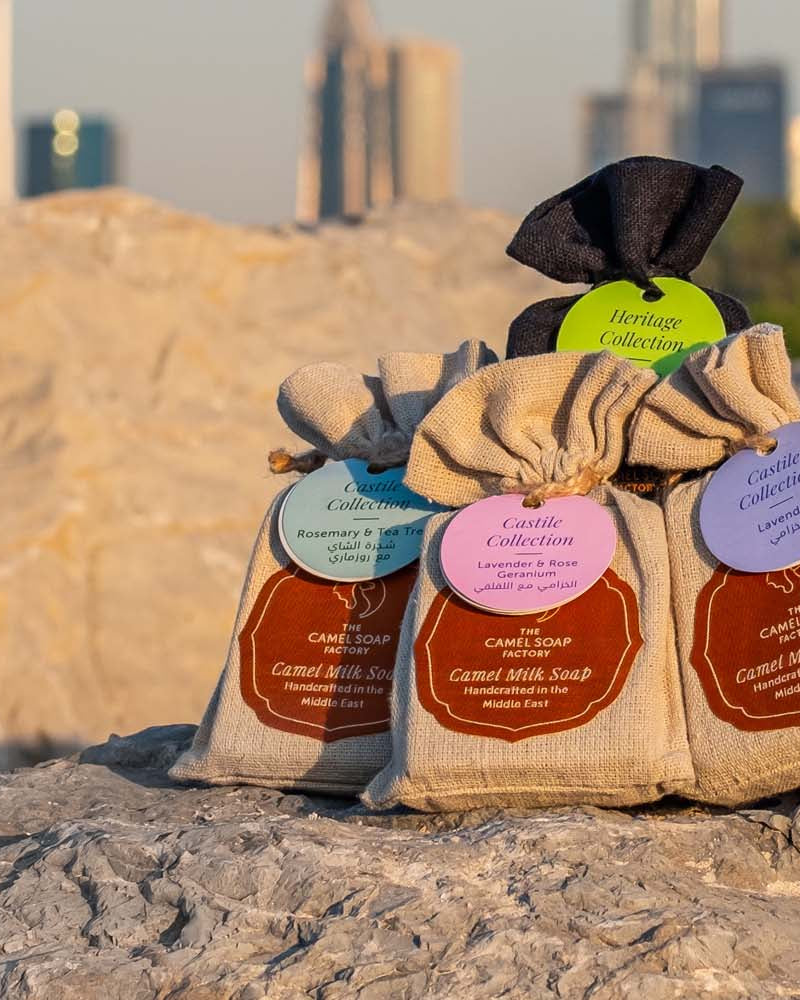
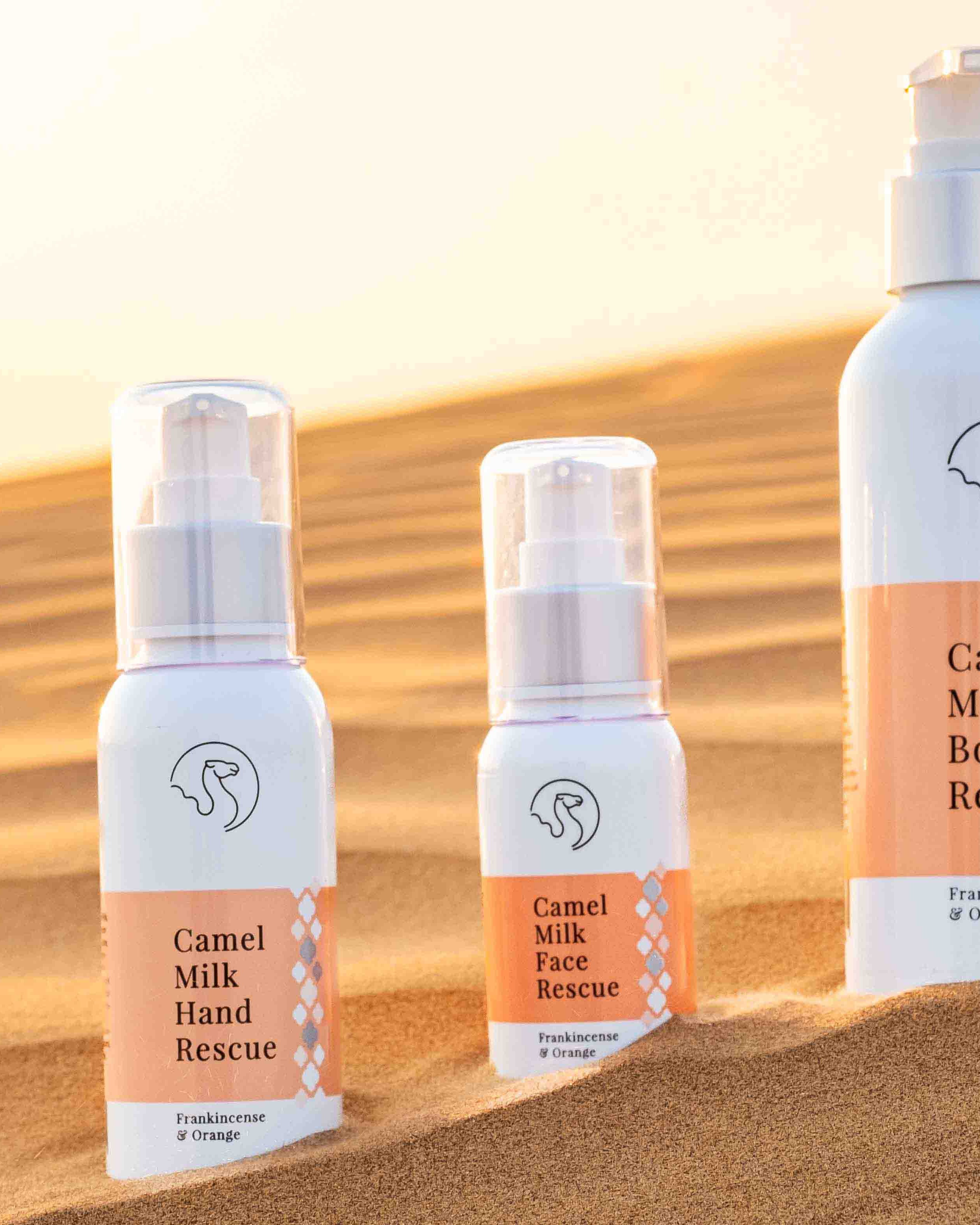
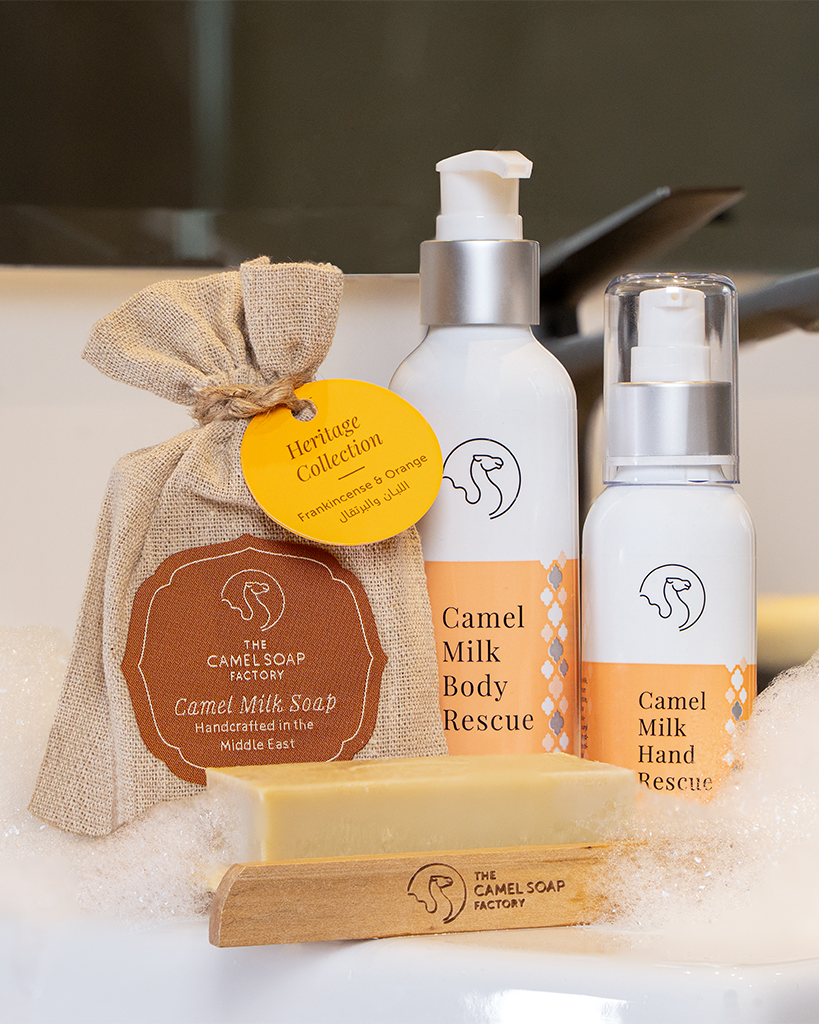
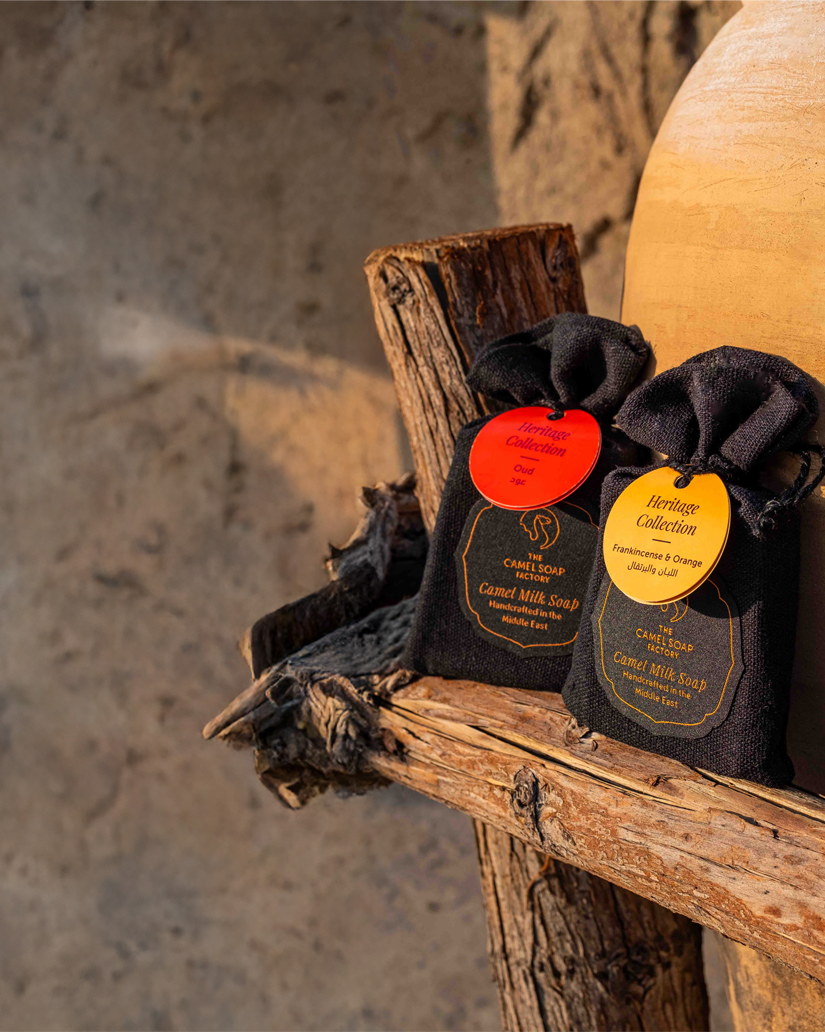
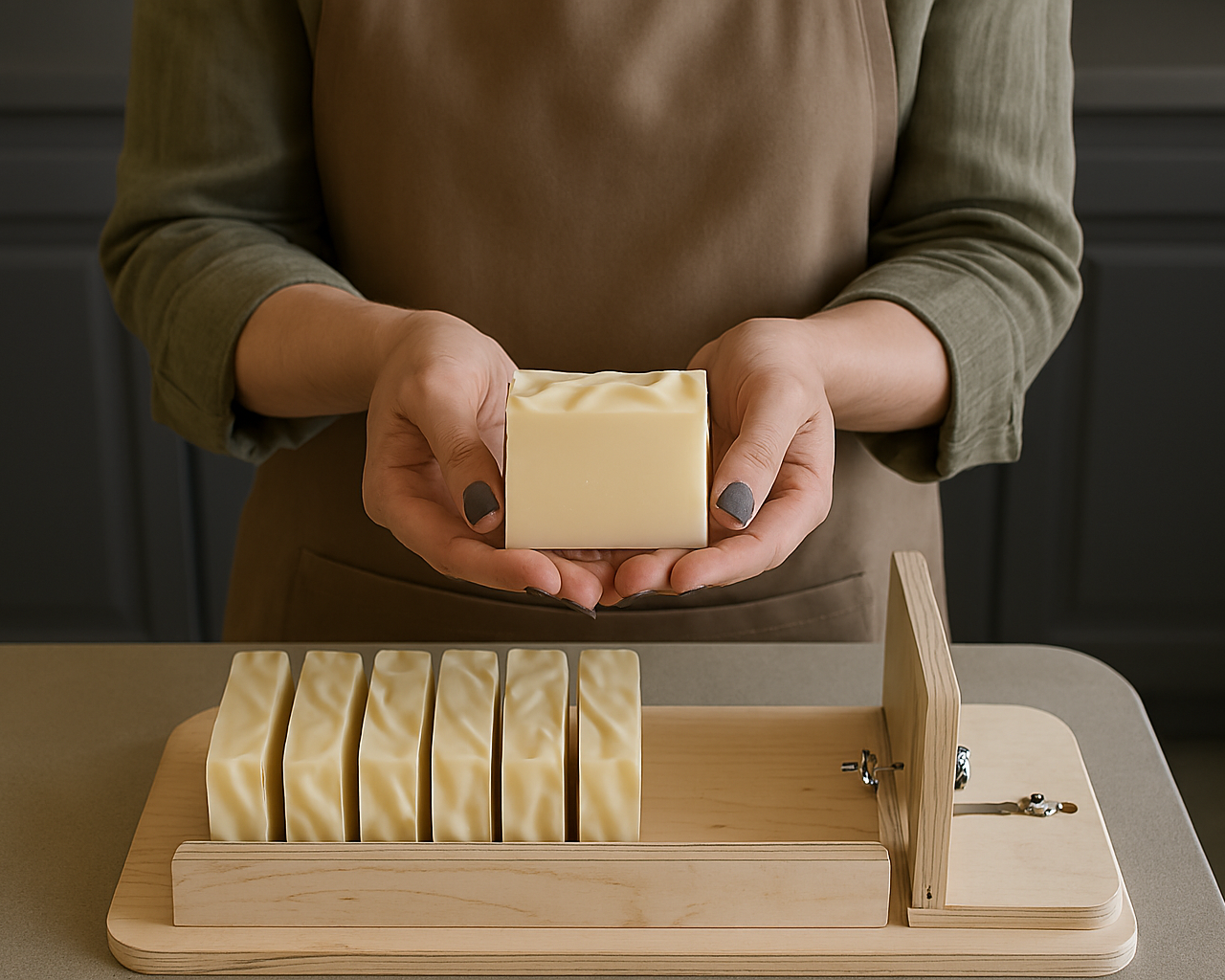
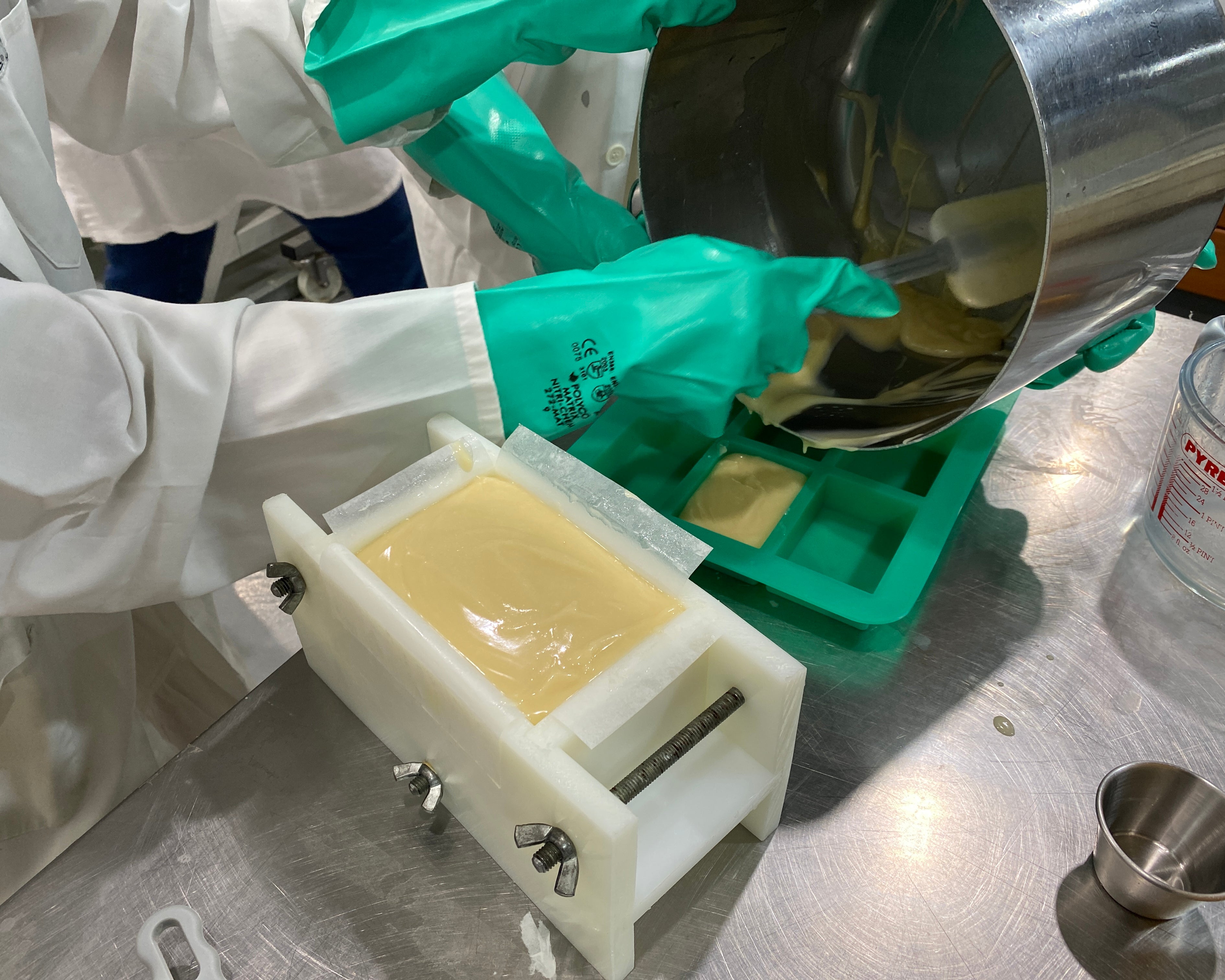
 1,837.50
1,837.50
